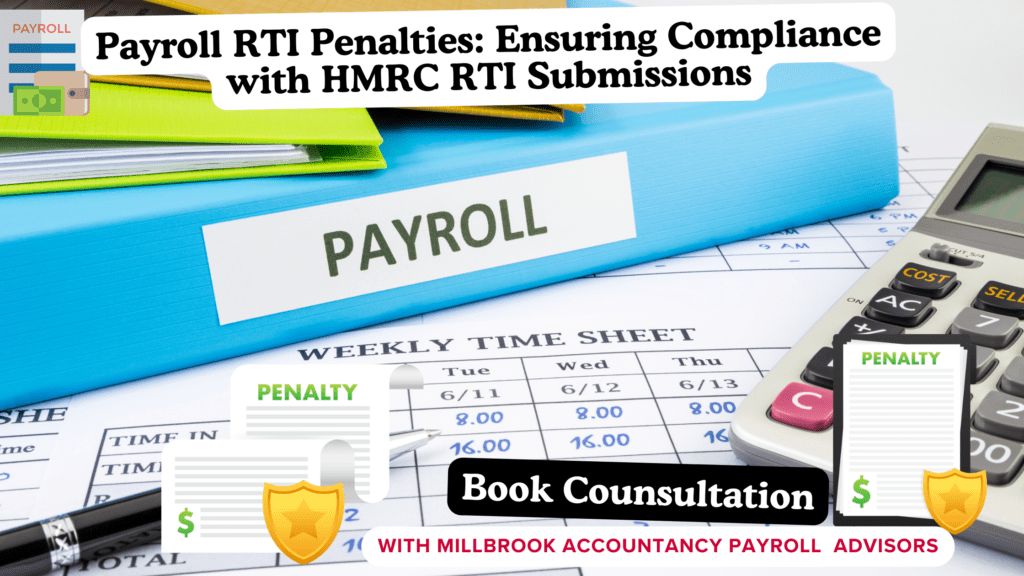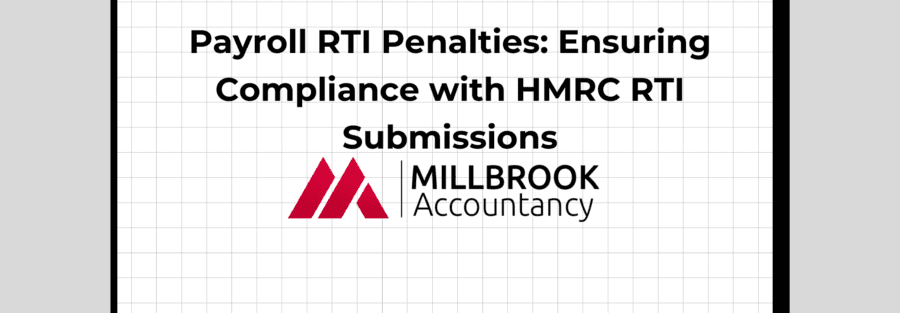In today’s digital age, Payroll RTI processing has evolved significantly, with Real-Time Information (RTI) submissions playing a crucial role in ensuring accurate and timely reporting to HM Revenue & Customs (HMRC). However, failure to comply with RTI regulations can result in significant penalties for employers. In this comprehensive guide, we’ll delve into the intricacies of RTI submissions, explore the penalties for non-compliance, and provide valuable insights into ensuring compliance with HMRC’s RTI requirements.
Understanding RTI Submissions:
RTI submissions represent a fundamental shift in the way payroll information is reported to HMRC. Unlike traditional methods that involved periodic submissions, RTI requires employers to report payroll information in real-time, ensuring that HMRC has access to up-to-date data on employee earnings, tax deductions, and National Insurance contributions.
Key components of RTI submissions include:
- Full Payment Submissions (FPS): FPS is the cornerstone of RTI reporting, requiring employers to submit comprehensive details of employee payments, deductions, and tax contributions each time they run their payroll. This real-time reporting ensures that HMRC has accurate data on employee earnings and tax liabilities.
- Earlier Year Updates (EYU): EYU allows employers to correct any errors or make adjustments to previously submitted information at the end of the tax year. This ensures that any discrepancies or inaccuracies in payroll reporting can be rectified promptly.
- Employer Payment Summaries (EPS): EPS is used to report adjustments to PAYE payments, such as statutory payments (e.g., Statutory Maternity Pay, Statutory Sick Pay) or deductions for employee benefits.
Overview of RTI Penalties
HMRC imposes penalties on employers who fail to comply with RTI regulations, including late submissions, inaccurate reporting, and late payments of PAYE. Understanding the penalties associated with non-compliance is essential for employers to avoid costly repercussions.
- Late Submission Penalties: Employers may incur penalties for submitting FPS after the payment date or failing to submit all required FPS. The penalties are calculated based on the frequency and severity of late submissions, with HMRC applying automatic in-year penalties since April 2015.
- Inaccurate Reporting Penalties: Penalties are applicable for inaccuracies in RTI submissions, including errors in employee earnings, tax deductions, or National Insurance contributions. Employers must ensure the accuracy of their payroll data to avoid penalties for inaccurate reporting.
- Late Payment Penalties: Employers who fail to make timely payments of PAYE may incur penalties, with HMRC charging interest on payments and penalties not paid by the relevant due date. It’s essential for employers to meet their payment obligations to avoid interest charges and penalties.
- Impact of Incorrect Reporting: Reporting wrong earnings or inaccurate information to HMRC can have severe consequences, including additional tax liabilities, penalties, and reputational damage. Employers must prioritize the accuracy and integrity of their payroll data to avoid compliance issues.
Compliance Measures
Ensuring compliance with HMRC’s RTI requirements is paramount for employers to avoid penalties and maintain a good standing with tax authorities. Here are some key compliance measures that employers should adhere to:
- Register for PAYE with HMRC: Employers must register for PAYE with HMRC and obtain the necessary credentials to submit RTI returns. Registration ensures that employers are aware of their reporting obligations and can access HMRC’s online services for payroll submissions.
- Understand Reporting Obligations: Employers should familiarize themselves with HMRC’s RTI reporting obligations, including the frequency of submissions, deadlines, and requirements for accurate reporting. Understanding the nuances of RTI submissions helps employers avoid compliance pitfalls and penalties.
- Maintain Accurate Payroll Records: Employers must maintain accurate payroll records, including employee earnings, tax deductions, and National Insurance contributions. Robust record-keeping practices ensure that payroll data is reliable and can be used for RTI submissions and compliance purposes.
- Adopt RTI-Enabled Payroll Software: Investing in RTI-enabled payroll software can streamline the payroll process and facilitate real-time reporting to HMRC. RTI software automates payroll calculations, generates FPS and EPS submissions, and helps employers stay compliant with RTI regulations.
Benefits of Outsourcing Payroll
For small businesses or organizations with limited resources, outsourcing payroll to a reputable accounting firm can offer several benefits, including:
- Expertise and Compliance: Outsourcing payroll to experienced professionals ensures compliance with HMRC’s RTI requirements and reduces the risk of errors or inaccuracies in payroll reporting.
- Time and Cost Savings: By outsourcing payroll, employers can free up valuable time and resources that can be redirected towards core business activities, driving efficiency and productivity.
- Access to Technology: Outsourcing firms leverage advanced payroll software and technology to streamline payroll processing, enhance data security, and improve reporting accuracy.
- Risk Mitigation: Outsourcing payroll transfers the responsibility for compliance and regulatory requirements to the service provider, reducing the risk of penalties or fines for non-compliance.
Impact of Incorrect Reporting
Incorrect reporting of payroll information to HMRC can have severe consequences for employers. When employers report wrong earnings or provide inaccurate information, it can lead to additional tax liabilities, penalties, and reputational damage. HMRC relies on accurate payroll data to calculate taxes owed by individuals and businesses. Therefore, it’s crucial for employers to prioritize the accuracy and integrity of their payroll reporting to avoid compliance issues and penalties.
Compliance Measures
To ensure compliance with HMRC’s RTI requirements, employers should take proactive measures to fulfill their reporting obligations accurately and on time. Here are some key compliance measures to consider:
Register for PAYE with HMRC: Employers must register for the Pay As You Earn (PAYE) scheme with HMRC and obtain the necessary credentials to submit RTI returns. Registration ensures that employers are recognized by HMRC for tax purposes and can access online services for payroll submissions.
Understand Reporting Obligations: Employers should familiarize themselves with HMRC’s RTI reporting obligations, including the frequency of submissions, deadlines, and requirements for accurate reporting. Understanding these obligations helps employers avoid compliance pitfalls and penalties.
Maintain Accurate Payroll Records: Employers must maintain accurate and up-to-date payroll records, including employee earnings, tax deductions, and National Insurance contributions. Robust record-keeping practices ensure that payroll data is reliable and can be used for RTI submissions and compliance purposes.
Adopt RTI-Enabled Payroll Software: Investing in RTI-enabled payroll software can streamline the payroll process and facilitate real-time reporting to HMRC. RTI software automates payroll calculations, generates FPS and EPS submissions, and helps employers stay compliant with RTI regulations.

Benefits of Outsourcing Payroll RTI
Outsourcing payroll to a reputable accounting firm can offer several benefits to employers, especially small businesses or organizations with limited resources:
Expertise and Compliance: Outsourcing payroll to experienced professionals ensures compliance with HMRC’s RTI requirements and reduces the risk of errors or inaccuracies in payroll reporting. Accounting firms specialize in payroll processing and stay updated on regulatory changes to ensure accurate and timely submissions.
Time and Cost Savings: By outsourcing payroll, employers can free up valuable time and resources that can be redirected towards core business activities. Outsourcing eliminates the need for in-house payroll staff and reduces administrative overhead costs associated with payroll processing.
Access to Technology: Outsourcing firms leverage advanced payroll software and technology to streamline payroll processing, enhance data security, and improve reporting accuracy. Employers benefit from access to state-of-the-art technology without the need for significant upfront investment.
Risk Mitigation: Outsourcing payroll transfers the responsibility for compliance and regulatory requirements to the service provider, reducing the risk of penalties or fines for non-compliance. Accounting firms assume liability for payroll processing errors and take steps to mitigate risks on behalf of their clients.
Conclusion
In conclusion, compliance with HMRC’s RTI requirements is essential for employers to avoid penalties and maintain a smooth payroll process. By understanding the intricacies of RTI submissions, adopting robust compliance measures, and considering outsourcing payroll to experts, employers can ensure accurate and timely reporting to HMRC, safeguarding their financial interests and reputation. Prioritizing compliance with RTI regulations is not only a legal obligation but also a strategic imperative for businesses seeking long-term success and sustainability.
If You Want Free Consultation Feel Free to contact our qualified Accountants





